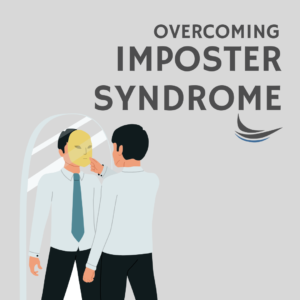Overcoming Imposter Syndrome
 You’ve achieved success, received accolades, and been recognized for your talents and hard work. Yet, a persistent voice in your head tells you that you’re a fraud, that you don’t deserve your accomplishments, and that it’s just a matter of time before you’re exposed. If this sounds familiar, you might be dealing with imposter syndrome.
You’ve achieved success, received accolades, and been recognized for your talents and hard work. Yet, a persistent voice in your head tells you that you’re a fraud, that you don’t deserve your accomplishments, and that it’s just a matter of time before you’re exposed. If this sounds familiar, you might be dealing with imposter syndrome.
Imposter syndrome is a psychological phenomenon that plagues many high achievers. It’s the feeling of inadequacy and self-doubt despite clear evidence of competence and success. The good news is that imposter syndrome is not a permanent condition, and it’s possible to overcome it.
Understanding Imposter Syndrome
Imposter syndrome, sometimes called imposter phenomenon, was first identified by psychologists Pauline Rose Clance and Suzanne Imes in the 1970s. They found that high-achieving individuals often felt like imposters in their fields, attributing their success to luck or external factors rather than their abilities.
Imposter syndrome manifests in various ways, but there are common patterns that many people experience:
- Perfectionism: The belief that any small mistake or imperfection is a sign of failure and incompetence.
- Discounting Success: Dismissing personal achievements as flukes or luck rather than acknowledging one’s skills and efforts.
- Fear of Failure: Avoiding new challenges or opportunities to prevent potential failure, even if they are well-qualified for the task.
- Comparison: Constantly comparing oneself to others and feeling inadequate when measured against their achievements.
- Overworking: Overcompensating for perceived inadequacies by working excessively hard and often sacrificing personal well-being.
- Self-Doubt: Feeling like a fraud or fearing being “found out” as inadequate.
Conquering Imposter Syndrome
Imposter syndrome can hinder personal and professional growth and lead to burnout and diminished self-esteem. The key to overcoming it lies in recognizing and challenging the negative thought patterns that fuel it. Here are some strategies to help you conquer imposter syndrome:
- Acknowledge Your Feelings
The first step in overcoming imposter syndrome is acknowledging that you’re experiencing it. Recognize that it’s a common phenomenon and that many successful individuals have felt the same way at some point. Acknowledging your feelings can help reduce the power they have over you.
- Challenge Negative Thoughts
Imposter syndrome thrives on negative self-talk. Challenge these thoughts by asking yourself whether they are based on facts or just fears. Are there objective reasons for your self-doubt, or is it merely a product of your imposter syndrome?
- Keep a Journal
Journaling is a powerful tool for self-reflection and personal growth. Keep a journal where you document your achievements, no matter how small they may seem. This practice will help you recognize your accomplishments and counteract the tendency to downplay your success.
- Set Realistic Goals
Perfectionism often fuels imposter syndrome. Instead of aiming for perfection, set realistic and achievable goals. Focus on progress and growth rather than striving for unattainable standards.
- Seek Feedback and Support
Don’t hesitate to seek feedback from trusted mentors, colleagues, or friends. They can provide valuable insight into your abilities and help counteract the self-doubt of imposter syndrome. Remember, you don’t have to face this challenge alone.
- Practice Self-Compassion
Be kind to yourself. Treat yourself with the same kindness and understanding you would offer to a friend facing similar self-doubts. Self-compassion can help alleviate the emotional burden of imposter syndrome.
- Embrace Failure
Failure is a natural part of growth and learning. Instead of avoiding it, embrace it as a valuable experience. Failure can be a steppingstone to success and is not an indication of inadequacy.
- Develop a Growth Mindset
A growth mindset is the belief that abilities and intelligence can be developed through dedication and hard work. Embrace challenges and view setbacks as opportunities for growth and learning.
- Celebrate Achievements
Celebrate your accomplishments, no matter how small they may seem. Recognize and acknowledge your successes, and don’t be too quick to dismiss them as insignificant.
- Professional Help
If your imposter syndrome is severely impacting your life, consider seeking support from a mental health professional. Therapy can provide you with the tools to confront and conquer imposter syndrome.
Imposter syndrome is a common experience, but it doesn’t have to define your life or limit your potential. By acknowledging your feelings, challenging negative thoughts, and practicing self-compassion, you can overcome this self-doubt and embrace your true abilities and accomplishments.



























